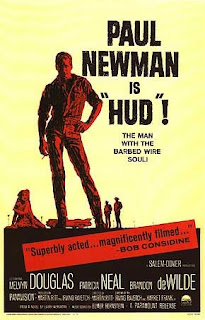Hud

Hud is definitely not for everyone, but I thought it was a fascinating, powerful character study, as well as a snapshot of the dying of the American West. Granted, that has been the subject matter of many, many films (including The Last Picture Show, which was also based on a Larry McMurtry novel, as was Hud) but it may not have been done better here. Director Martin Ritt took the material and crafted a small masterpiece.
Paul Newman is the title character, and he puts his innate charm to the test, as Hud is a character without any redeeming qualities. He drinks, runs around with married woman, and seems to have hit all of the seven deadly sins. What makes it worse is that he doesn't care about much of anything but himself. He is responsible for his older brother's death many years before, which gives him a few twinges of guilt, but that's about the only sympathetic trait he has.
He lives on a ranch with his father, Melvyn Douglas, who his pretty much the exact opposite, a man of decency, integrity and loyalty. When their cattle come down with hoof-and-mouth disease, Hud tells the old man to sell them to some poor sucker, which horrifies the old man. Douglas has long ago given up on Hud, and does his best to tolerate him. Instead, he focuses most of his love and attention on Lon (Brandon de Wilde) the son of Hud's dead brother, who both idolizes his wayward uncle and his afraid of him.
Also living in the household is a housekeeper, played by Patricia Neal. Both Hud and Lon have feelings for her, but Hud's is entirely carnal, while Lon, who is only seventeen, feels the first stirrings of love for the woman, who in the place of his deceased mother, provides nurturing him for him. She is a cynical, wise-cracking divorced woman, who rebuffs Hud's overtures by telling him, "I've had one cold-blooded bastard, I'm not looking for another."
As the main thread of the plot concerning the cattle plays out, the characters bounce off each other. Douglas will not lease his land to oil companies, as he would rather die out with the old ways, while Hud waits him out, carousing and alienating everyone he knows. At first Lon wants to get closer to his uncle, but after Hud drunkenly attacks Neal, he realizes Hud is beyond redemption. The film ends with Lon leaving, telling Hud, he won't be back, but this doesn't move Hud in the least. He resolutely resists salvation.
If this film isn't a feel-good film, it is nonetheless enthralling, with four excellent characterizations and performances. Neal and Douglas both won Oscars (Neal won for Best Actress, which was somewhat controversial because she has a relatively small part. She suffered a stroke before the ceremony which may have garnered some sympathy votes, but she's very good anyway). Ritt has also given us a textbook case in how to compose a frame. Every now and then I noticed how magnificently the actors were arranged in the shot. The photography, in black and white, was by James Wong Howe, and I don't know if it could be any better.
For all this, Hud is still Newman's picture, and he carries it brilliantly. It may be jarring for some to see the mild-mannered salad dressing salesman and race-car driver play such a cad, but it proves how effective his range was.


Comments
Post a Comment